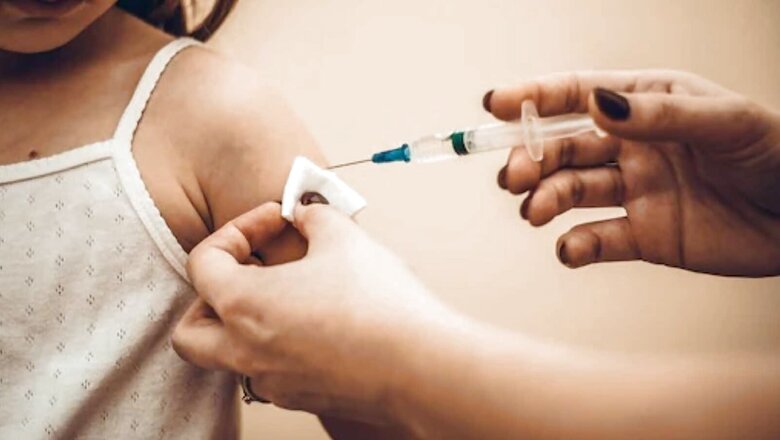
views
The ICMR-National Institute of Virology (NIV) in Pune has been at the forefront of scientific research on SARS-CoV-2 in the country. “2021 was a difficult but rewarding year for us”, said Ms Priya Abraham, Director of ICMR-NIV in an interview with India Science, the OTT channel of the Department of Science & Technology.
Giving an overview of vaccine development process at the institute, she said, “We quickly isolated and gave a strain to Bharat Biotech International Limited (BBIL) by the end of April (2020), after which they developed a whole virion-inactivated vaccine in the month of May and gave us back for review. We checked it for its complete inactivation, did its complete characterisation and started pre-clinical trials on hamsters and non-human primates, that is, monkeys. In the next phase, we assisted them in the Phase I, II and III clinical trials in areas such as diagnostic aspect and laboratory support”.
Here are some excerpts from the interview on the scientific developments on COVID-19.
In which stage is the trial of Covaxin on children running and by when can we expect to have vaccine for children?
Presently, Phase II and III trials of COVAXIN are going on for children in the age group of 2-18 years. Hopefully, the results are going to be available very soon. The results will be presented to the regulators. So, by September or just after it, we may have COVID-19 vaccines for children. This apart, Zydus Cadila’s vaccine trial is also going on. This can also be applied for children and will be made available.
Apart from these, what other vaccines can be made available for our citizens?
Zydus Cadila’s vaccine will be the first DNA vaccine which will be available for use. Besides, there is Gennova Biopharmaceuticals Ltd’s m-RNA vaccine, Biological-E vaccine, Serum Institute of India’s Novovax and, another interesting one – an intra-nasal vaccine developed by Bharat Biotech International Limited. This vaccine does not require a jab and can be delivered through nostrils.
Will any of the presently available vaccines be effective on Delta-Plus variant?
First of all, the Delta-plus variant is less likely to spread than the Delta variant itself. Mainly Delta variant is present in over 130 countries. It has spread all over the world and it is this variant which is highly transmissible. In NIV we have done studies on this variant. We have studied the antibodies produced in the bodies of vaccinated people and checked it against this variant. It has been found that efficacy of antibodies against this variant has been reduced two to three folds. Yet, the vaccines are still protective against the variants. They may show a little less efficacy, but vaccines are very important to prevent serious forms of disease due to which patients may get hospitalized and even die. So, whatever the variant, vaccine is till now protective against all, including the Delta variant. So, there should not be any hesitancy at all.
Are we going to require a booster dose in the coming times? Is any study being conducted on this matter?
Studies on booster dose have been going on overseas and at least seven different vaccines have been tried out for booster dose. Now, WHO has put a stop to it till more countries catch up with vaccination. This is because there is an alarming vaccine gap between high-income and low-income countries. But, in future, recommendations for boosters will definitely come.
Are studies also on for mix and match of vaccines? Will it be beneficial for us?
There was a situation where inadvertently two different vaccines were given in two doses. We have tested those samples at NIV and found that the patients who received different vaccines in two doses were safe. No adverse effect was noted and immunogenicity was a little better. So, it is definitely not something which will cause a safety issue. We are studying this phenomenon and will be able to give more details in a few days’ time.
Has any new COVID-19 testing method emerged that gives better results and can be trusted more?
Hospitals and laboratories were overwhelmed by the huge number of cases during the second wave. Many of their staff members were infected. So, efficiency of testing had reduced during that time. There was a shortage of reagents also. All these affected the efficacy of testing. RT-PCR testing method is by itself only about 70 per cent sensitive. But it is still recommended by WHO. But, in the future we may see easier and quicker ‘point-of-care’ tests where we need not send samples to labs.
Please tell us about ICMR developed RT-LAMP Test.
RT-LAMP assay produced by ICMR is a cost-effective assay. It does not require expensive equipment or extensive training and can also be done at Primary Health Centres in districts. These kinds of quick and fast tests which can be done in technologically not so advanced places will become more popular in the future.
Self-testing kits have also come in markets now. Will it further pace up testing?
Self-testing kits are antigen testing kits and so, their sensitivity is inferior to RT-PCR method. The sensitivity is likely to be more in symptomatic patients. But, for asymptomatic patients, the sensitivity will be less.
Can people infected by Bird-Flu or Zika Virus become susceptible to SARS-CoV-2 infection?
Bird Flu and Zika Virus are unrelated to Coronavirus. But one commonality between HINI Bird Flu or Swine Flu Virus and SARS-CoV-2 is that their spread is prevented by good use of masks, physical distancing, hand hygiene and cough etiquette. All these viruses spread through the respiratory route. Thus, by following COVID Appropriate Behaviour we can limit the spread of all these viruses. However, Zika Virus spreads through mosquito bites.
Do chances of COVID-19 infection increase during monsoon?
Yes, viral infections like Dengue, Chikangunya and Zika Virus infections that spread through mosquito bites are going to increase during monsoon. Accumulated water should not be kept in the surroundings as mosquitoes breed in it. It will be worse to have corona infection on top of these infections which spread through mosquito bites.
Many images of crowded places are circulating in media. How much harm can this irresponsible behaviour cause?
Definitely, this will be a problem and we will be ‘inviting’ the next wave. Dr Tedros A. Ghebreyusus, DG of WHO says, “The pandemic will end when we choose to end it. It is in our hands.” It means that we have to be careful. Especially in the upcoming festival season, we should not indulge in crowding because that is how the virus will spread.
Is it possible that no other wave will come?
New variants will keep on coming. We have two weapons which are the biggest protection. These are: wearing mask properly and actively encouraging everyone to get vaccinated. Then even if a wave comes, it will not be a big one.
Read all the Latest News, Breaking News and Assembly Elections Live Updates here.




















Comments
0 comment